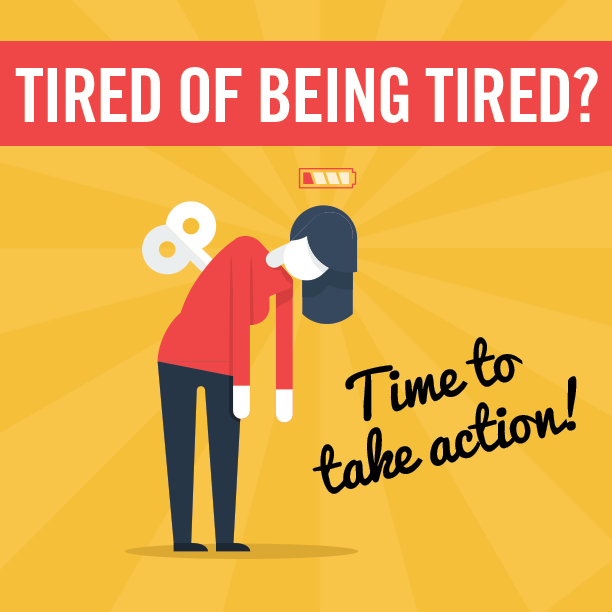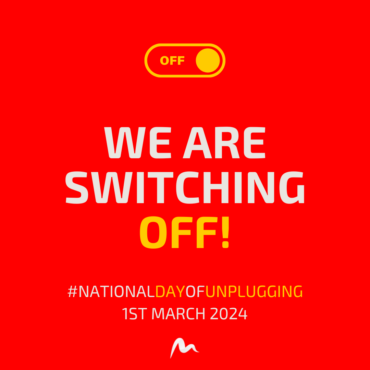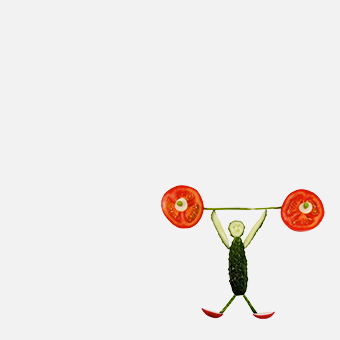Are you finding it hard to get out of bed in the morning? You are most certainly not alone! Do cold and dark mornings make it even worse? And then the party season comes along, and you are even busier with more late nights. So no wonder we all feel a bit tired and sluggish.
What causes tiredness?
Tiredness can be caused simply because you are doing too much and not looking after yourself – maybe working longer hours, staying out late or not eating a sensible diet. Anxiety can be exhausting too. Stress caused by emotional situations; illness or death of a family member or friend, moving house and getting divorced are all causes of anxiety that can make you feel more tired than usual.
Fatigue Symptoms
Tiredness, in general terms, means you have reduced energy for your everyday life. You may have physical or mental exhaustion and a lack of motivation for doing things. It can be accompanied by a range of other physical, mental and emotional symptoms such as:
- headaches
- dizziness
- aching muscles
- muscle weakness
- slowed reflexes and responses
- impaired decision-making and judgement.
- Moodiness and irritability
At any one time one in five people in this country feel ‘unusually tired’, but however common it is, it isn’t normal.
Tackling tiredness
Energy boosting foods and better nutrition can really help combat tiredness. This does not mean sugary snacks and quick release energy bars – these may give you a short benefit but you will often feel worse in the long term. You are aiming to keep your blood sugar levels steady throughout the day.
You need foods that form part of a balanced diet and provide optimum nutritional value. You are aiming to support your bodily functions, improve emotional and physical health and promote overall well-being. A healthy balance of all the main food groups – starchy foods, five portions of fruits and vegetables, dairy and protein – is considered essential to help combat tiredness in the long-term.
Extra tips…
1. Have a healthy breakfast. One third of people don’t eat breakfast but it’s important to start the day as you mean to go on!
2. Eating wholegrain rice, pasta, cereal and bread will give you a slow release energy throughout the day.
3. Drinking at least 1.5 litres of water a day will ensure you are not dehydrated – another cause of tiredness.
4. Don’t skip meals – that makes you vulnerable to reaching for sugary snacks, which make things worse.
5. Achieving your five a day every day will ensure you have a good dose of nutrients and minerals – essential for long term health.
6. Avoid caffeine and alcohol as they will dehydrate you.
7. Minimise your sugar intake.
The power of exercise
Using exercise to reduce tiredness always seems a bit of a contradiction, because surely exercise makes you more tired. But the health benefits are well proven and getting moving helps your overall well-being. Think of it getting yourself “healthy tired!”
Even a single 15-minute walk will raise your endorphin levels and boost your mood – giving you an energy boost. Start with a small amount of exercise, and gradually build up until you reach the recommended goal of two-and-a-half hours of moderate-intensity aerobic exercise, such as cycling or fast walking, every week.
Get as much daylight as you can. Whenever possible, be outside during the winter months. Even though the sunlight is weaker than in summer it still boosts your vitamin D, which in turn boosts your immune system.
Although almost any exercise is good, yoga may be especially effective for boosting energy levels. After six weeks of once-a-week yoga classes, volunteers in a British study reported improvements in clear-mindedness, energy and confidence. At the end of six months, participants reported an increased sense of well-being and a boost in overall energy.
If in doubt, visit your GP
There are medical causes of tiredness, such as an underactive thyroid, anaemia, diabetes, a virus or a bacterial infection. If you are concerned about your symptoms, go and get checked out by your GP.
Chronic fatigue and SAD
SAD is a type of depression that reveals itself in winter and is thought to be associated with decreased light. Symptoms include low mood, lethargy and sleeping more. People suffering this disorder may also be more irritable and generally feel down. Weight gain is also possible as there may be cravings for carbohydrates. The shorter days also cause changes to your natural body rhythms, resulting in a type of hibernation response that in some people results in depression.
Chronic fatigue syndrome (CFS) causes persistent fatigue (exhaustion) that affects everyday life and doesn’t go away with sleep or rest. It is also known as ME, which stands for myalgic encephalomyelitis. CFS is a serious and often long term condition. If you suspect that you have this you should see your doctor.
“People who become active have a greater sense of self-confidence. But exercise also improves the working efficiency of your heart, lungs, and muscles. That’s the equivalent of improving the fuel efficiency of a car. It gives you more energy for any kind of activity.” Kerry J. Stewart, professor of medicine and director of clinical and research exercise physiology at Johns Hopkins University School of Medicine.


















